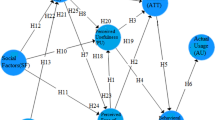Abstract
The study uses the Technology Acceptance Model, the Diffusion of innovation model and constructs of trust, risk and personal innovativeness in order to build a model for teachers’ adoption of e-governance in Greece. Primary and secondary education teachers responded to an online survey resulting to 230 questionnaires. A SEM validation of the proposed model reveals that Personal Innovativeness, Compatibility and Relative advantage are stronger predictors of intention to use, compared to trust, and perceived risk. Even though the study offers the first piece of evidence on e-governance website adoption by teachers, the recommendations would be helpful in developing and implementing new e-governance plans.
Access this chapter
Tax calculation will be finalised at checkout
Purchases are for personal use only
Preview
Unable to display preview. Download preview PDF.
Similar content being viewed by others
References
Agarwal, R., Prasad, J.: A Conceptual and Operational Definition of Personal Innovativeness in the Domain of Information Technology. Information System Research 9(2), 204–215 (1998)
Al-adawi, Z., Yousafzai, Z., Pallister, J.: Conceptual Model of citizen adoption of e-government. Paper presented at The Second International Conference on Innovations in Information Technology (2005)
AlAwadhi, S., Morris, A.: The Use of the UTAUT Model in the Adoption of E-government Services in Kuwait. In: Proceedings of the 41st Hawaii International Conference on System Sciences, pp. 1–11 (2008)
Bagozzi, R., Davi, F., Warshaw, P.: Development and Test of a Theory of Technological Learning and Usage. Human Relations 45(7), 659–686 (1992)
Bagozzi, R.P., Yi, Y.: On the evaluation of structure equation models. Journal of the Academy of Marketing Science 16, 74–94 (1988)
Belanger, F., Carter, L.: Trust and risk in e-government adoption. Journal of Strategic Information Systems 17(2), 165–176 (2008)
Carter, L., Bélanger, F.: The Utilization of E-Government Services: Citizen Trust, Innovation and Acceptance Factors. Information Systems Journal 15(1), 5–25 (2005)
Colesca, S.E.: Increasing e-trust: a solution to minimize risk in the e-government adoption. Journal of applied quantitative methods 4(1), 31–44 (2009)
Colesca, S.E., Dobrica, L.: Adoption and use of e-government services: The case of Romania. Journal of Applied Research and Technology 6(3), 204–217 (2008)
Dashti, A., Benbasat, I., Burton-Jones, A.: Developing trust reciprocity in electronic government: The role of felt trust. In: European and Mediterranean Conference on Information Systems 2009, Crowne Plaza Hotel, Izmir, July 13-14 (2009), http://www.iseing.org/emcis/EMCIS2009/Proceedings/Presenting%20Papers/C16/C16.pdf
Davis, F.: Perceived Usefulness, Perceived Ease of Use, and User Acceptance of Information Technology. MIS Quarterly 13, 318–341 (1980)
Fishbein, M., Ajzen, I.: Belief, attitude, intention, and behavior: An introduction to theory and research. Addison-Wesley, Reading (1975)
Fornell, C., Larcker, D.F.: Evaluating structural equation models with unbearable and measurement error. Journal of Marketing Research (18), 39–50 (1981)
Gold, A.H., Malhotra, A., Segars, A.H.: Knowledge management: an organization capabilities perspective. Journal of Management Information Systems 18(1), 185–214 (2001)
Hair Jr., F., Anderson, R.E., Tatham, R.L., Black, W.C.: Multivariate data analysis, 5th edn. Prentice Hall, Upper Saddle River (1998)
Huang, S.-Y., Chang, C.-M., Yu, T.-Y.: Determinants of user acceptance of the e-Government services: The case of online tax filing and payment system. Government Information Quarterly 23(1), 97–122 (2006)
Jaeger, P.T., Matteson, M.: e-Government and Technology Acceptance: the Case of the Implementation of Section 508 Guidelines for Websites. Electronic Journal of e-Government 7(1), 87–98 (2009), http://www.ejeg.com
Luo, G.: e-government, people and social change: A case study of China 38(3), 1–23 (2009)
Malhotra, Y., Galletta, D.: Extending the Technology Acceptance Model to Account to Account for Social Influence: Theoretical Bases and Empirical Validation. In: Proceedings of the 32nd Hawaii International Conference on System Sciences (1999)
Mofleh, S., Wanous, M.: Understanding Factors Influencing Citizens Adoption of e-Government Services in the Developing World: Jordan as a Case Study. Journal of Computer Science 7(2), 1–11 (1999)
Panagis, Y., Sakkopoulos, E., Tsakalidis, A., Tzimas, G., Sirmakessis, S., Lytras, M.D.: Techniques for mining the design of e-government services to enhance end-user experience. Int. J. Electronic Democracy 1(1), 32–50 (2008)
Patel, H., Jacobson, D.: Factors Influencing Citizen Adoption of E-Government: A Review and Critical Assessment. In: Golden, W., Acton, T., Conboy, K., van der Heijden, H., Tuunainen, V.K. (eds.) 16th European Conference on Information Systems, Galway, Ireland, pp. 1058–1069 (2008)
Pavlou, P.A.: Consumer Acceptance of Electronic Commerce: Integrating Trust and Risk with the Technology Acceptance Model. International Journal of Electronic Commerce 7(3), 69–103 (2003)
Rogers, E.M.: Diffusion of innovations, 4th edn. Free Press, New York (1995)
Sang, S., Lee, J.-D., Lee, J.: E-government adoption in ASEAN: the case of Cambodia. Internet Research 19(5), 517–534 (2009)
Shih, H.-P.: Extended technology acceptance model of Internet utilization behavior. Information & Management 41(6), 719–729 (2004)
Teo, T., Srivastava, S., Jiang, L.: Trust and Electronic Government Success: An Empirical Study. Journal of Management Information Systems 25(3), 99–131 (2008)
The Economist Intelligence Unit:E-readiness ranking 2009. The usage imperative (2009), http://www-935.ibm.com/services/us/gbs/bus/pdf/e-readiness_rankings_june_2009_final_web.pdf
United Nations: UN e-government survey 2008. From E-Government to connected governance (2008), http://unpan1.un.org/intradoc/groups/public/documents/UN/UNPAN028607.pdf
Venkatesh, V., Davis, F.: A Theoretical Extension of the Technology Acceptance Model: Four Longitudinal Field Studies. Management Science 46(2), 186–204 (2000)
Wangpipatwong, S., Chutimaskul, W., Papasratorn, B.: Understanding Citizen’s Continuance Intention to Use e-Government Website: a Composite View of Technology Acceptance Model and Computer Self-Efficacy. The Electronic Journal of e-Government 6(1), 55–64 (2008), http://www.ejeg.com
Warkentin, M., Gefen, D., Pavlou, P.A., Rose, G.: Encouraging Citizen Adoption of eGovernment by Building Trust. Electronic Markets 12(3), 157–162 (2002)
Zafiropoulos, K., Karavasilis, I., Vrana, V.: Exploring e-governance acceptance by primary and secondary education teachers in Greece. International Journal of electronic democracy (2010) (in press)
Author information
Authors and Affiliations
Editor information
Editors and Affiliations
Rights and permissions
Copyright information
© 2010 Springer-Verlag Berlin Heidelberg
About this paper
Cite this paper
Karavasilis, I., Zafiropoulos, K., Vrana, V. (2010). Extending TAM to Understand E-Governance Adoption by Teachers in Greece. In: Lytras, M.D., Ordonez de Pablos, P., Ziderman, A., Roulstone, A., Maurer, H., Imber, J.B. (eds) Organizational, Business, and Technological Aspects of the Knowledge Society. WSKS 2010. Communications in Computer and Information Science, vol 112. Springer, Berlin, Heidelberg. https://doi.org/10.1007/978-3-642-16324-1_7
Download citation
DOI: https://doi.org/10.1007/978-3-642-16324-1_7
Publisher Name: Springer, Berlin, Heidelberg
Print ISBN: 978-3-642-16323-4
Online ISBN: 978-3-642-16324-1
eBook Packages: Computer ScienceComputer Science (R0)




